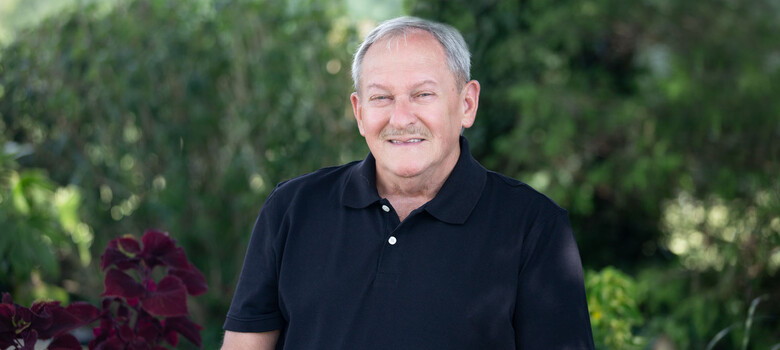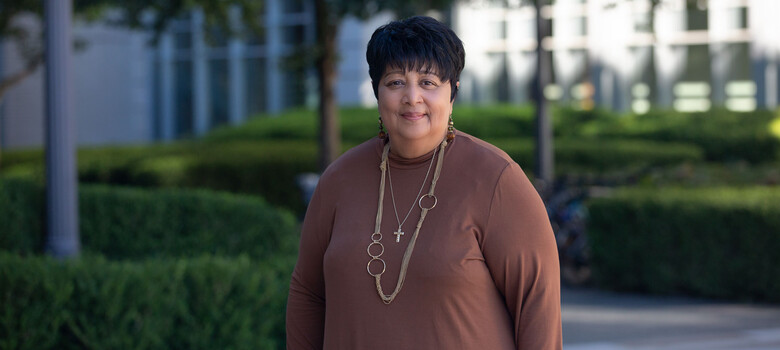Duke Experts Help Woman with Metastatic Cancer Live Longer, Better
When Breast Cancer Spread to Other Organs, NC Entrepreneur Turned to Duke

Since her diagnosis, Janet Gorence Davas has been able to continue traveling to collect antiques.
In Fall 2020, after beating breast cancer nearly 20 years earlier, Janet Gorence Davas learned the cancer was back and it had spread. She underwent surgery and radiation in New England where her daughter lives, but Davas wanted to return home to North Carolina. Her doctors recommended continuing treatment at the Duke Center for Brain and Spine Metastasis. There, Davas’s care team focused on slowing disease progression, limiting medication side effects, and treating the downstream effects of her incurable cancer. In the four years since her metastatic cancer diagnosis, Davas has remained active, continues to travel, and runs a business. “I'm optimistic in that I am getting the best care in the world in my opinion,” she said.
Symptoms Dismissed, Turn Out to Be Cancer
In 2019, local doctors blamed allergies and aging for the swelling under Janet Davas’ right eye. About a year later, imaging scans showed a malignant tumor behind that eye as well as lesions in her brain, spine, and bones. More testing revealed the cancer probably traveled from her breast, where she had cancer in 2002. “Getting a diagnosis like that is always extremely shocking,” she said. “I saw a death sentence.”
Seeking Treatment
Although she was living in Asheville, NC, Davas moved to Boston, MA for six months so she could go through the first phase of treatment with her daughter nearby. When Davas was ready to move back home for phase two, her doctor referred her to Duke medical oncologist Carey Anders, MD, who specializes in treating metastatic breast cancer and is medical director of the Duke Center for Brain and Spine Metastasis, part of the Duke Cancer Institute.
In March 2021, Davas met Dr. Anders along with radiation oncologist John Kirkpatrick, MD, palliative care specialist Betsy Fricklas, and the rest of her Duke care team. “I was surrounded on my very first visit with one of the most elite teams at Duke,” Davas said. “The doctors themselves are world-renowned.”
Finding the Right Treatment Plan
Davas began having regular blood draws and imaging appointments to keep tabs on her condition and fine-tune her treatment regimen. “At Duke, you have immediate results,” she said. “I have all those tests, and then I see my doctor that very same day. She walks in and says, ‘Everything's great.’” Davas has responded exceptionally well to a targeted therapy medication, which zeroes in on specific types of cancer cells and makes it more difficult for them to multiply.
In 2023, to combat medication side effects like nausea, vomiting, and diarrhea, Dr. Anders and the team switched Davas to another targeted therapy. “She's tolerated that so much better, and it has been just as effective at keeping the cancer at bay,” Dr. Anders said. To maximize her quality of life, Davas sees other Duke specialists to address related problems, like eye pain and dental issues, as well as a therapist for mental health support. “My team has been really, really sensitive to all of that,” Davas said.
Getting the Most Out of Life
Although Davas retired from her high-powered day job, she stays busy running a hobby antiques business. “I've been interested in antiques my entire life. My mother got me started, and it just brings me a lot of joy,” said Davas. She travels to Europe several times a year to scope out the best pieces. “That was one goal I had after my diagnosis,” she said. “I've been taking two to three overseas trips a year since.”
Earlier this year she moved closer to Duke. “Here I am from official diagnosis four-plus-years, living a very full life,” Davas said. “The bottom line is I'm thrilled to be living here in Durham and being treated at Duke.”




